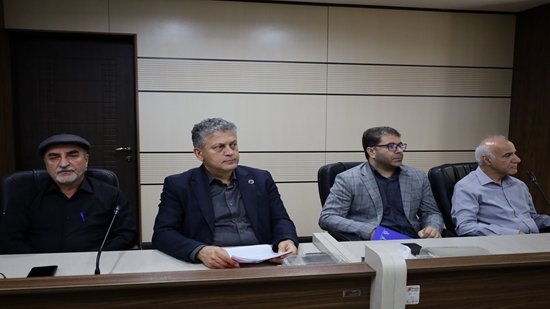The minds of the people are the primary target of war. The university serves as a stronghold of psychological peace during difficult times

.
The minds of the people are the primary target of war. The university serves as a stronghold of psychological peace during difficult times.
During a consultative meeting at the University of Social Welfare and Rehabilitation Sciences, experts emphasized that in modern warfare, the primary target of the enemy is the minds of the people. The university must serve as a stronghold for rebuilding collective mental health and preserving societal hope during difficult times.
According to the Public Relations Office of the Office of the Supreme Leader's representative at the university, the meeting was attended by the university chancellor, faculty members, and esteemed professors, along with speeches by experts in psychology, counseling, and social work, and was held earlier this year.
At the beginning of the session, Dr. Seyed Ali Hosseini, the university chancellor, expressed condolences for the Muharram mourning period and honored the memory of nuclear martyrs, military commanders, and the innocent Iranian people victims of Zionist aggression. He highlighted the effective role of the Ministry of Health in managing the recent crisis. Thanking the dedication of healthcare workers, particularly those at Razi Hospital, he emphasized that educational, research, therapeutic, and rehabilitative efforts must continue with seriousness during this period. He also acknowledged that experts in mental health and social health carry a doubled responsibility in the current circumstances, both in policy-making and implementation at the national level.
During the continuation of the meeting, Dr. Hamid Poursharifi, a faculty member in the Clinical Psychology Department, emphasized the importance of self-care for educators in crises. He introduced the Self-Care Cycle as a foundational element for fulfilling social responsibilities. He added that psychosocial support for students is one of the most important duties of educators during and after war. Dr. Poursharifi also highlighted the significance of empathy and effective dialogue with students.
Following this, Dr. Bahmani, a faculty member in the Counseling Department, analyzed the psychological characteristics of crises. He distinguished war crises from other types of crises, stating: War is designed to destroy the human mind and induce fear and confusion. He regarded psychological interventions as a critical factor in dealing with such crises and emphasized the need for environmental control and active confrontation to address the psychological consequences of war.
Next, Dr. Hajiha, a faculty member in the Clinical Psychology Department, outlined timely crisis detection and appropriate responses at the family and community levels as among the most important social responsibilities of educators. He discussed the ongoing activities of the university’s psychology group within the framework of the 4030 system, describing the services provided in mental health and underscoring the necessity of empowering psychologists in crisis management.
Dr. Sabzi, a faculty member in the Social Work Department, approached the topic from a sociological perspective. He highlighted the national cohesion and social solidarity stemming from enemy aggression, emphasizing the importance of leveraging this social capital. He discussed the roles of educators at the individual, university, and macro levels, critiquing some incorrect social analyses and stressing the critical role of universities in policymaking for policymakers.
The final speaker of this session, Dr. Younesi, a faculty member in the Counseling Department, discussed the concept of soft war following the hard ware. He identified the enemy's ultimate goal as destroying the patience and hope of the people. Citing verses from the Holy Quran and the teachings of Karbala, he emphasized that patience is a fundamental strategy for countering enemy tricks. He also highlighted the importance of adhering to the verse Nafye Sabeel (denial of dominance) and stressed the necessity of maintaining national dignity and independence.
At the end of the session, some attending professors shared their perspectives on various topics, including non-military defense, individual and family self-awareness, analysis of hostile Persian-language media, and the importance of supporting vulnerable groups such as children and the elderly.


نظر دهید